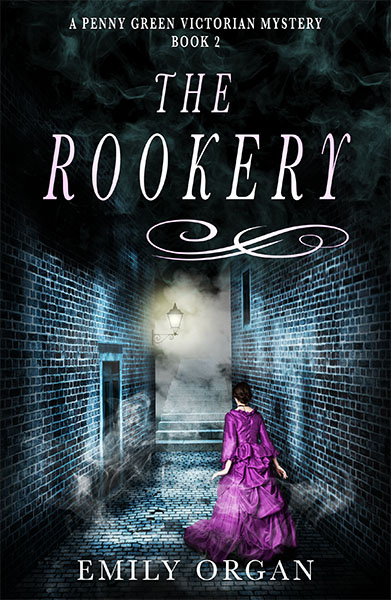
In the fog of Victorian London, a killer stalks the slums.
The diaries of Penny’s missing father are precious to her. When they’re snatched by a thief, news reporter Penny gives chase. The pursuit ends in St Giles Rookery and a brutal murder. Penny is implicated.
As she works to clear her name, Penny uncovers the slums’ tragic secrets – unsolved murders and a community ignored by authorities. Teaming up with Inspector James Blakely of Scotland Yard, Penny vows to find the killer.
Working with the inspector is complicated. And when the killer claims a victim outside the slums, London is sent into panic. The answer could lie where Penny least expects it. But she finds herself in danger as the fog closes in…
The Rookery is book 2 in the Penny Green Victorian Mystery Series by Emily Organ. Available as ebook, paperback, hardback and audiobook. Free to read with Kindle Unlimited.
Book 1 – Limelight
Book 2 – The Rookery
Book 3 – The Maid’s Secret
Book 4 – The Inventor
Book 5 – Curse of the Poppy
Book 6 – The Bermondsey Poisoner
Book 7 – An Unwelcome Guest
Book 8 – Death at the Workhouse
Book 9 – The Gang of St Bride’s
Book 10 – Murder in Ratcliffe
Book 11 – The Egyptian Mystery
Book 12 – The Camden Spiritualist
Read an excerpt from The Rookery My dearest Penny, I feel certain that you would adore Bogota. The cool, rarefied air here is a welcome respite from the oppressive heat of the lowlands. The city sits on a plateau that is eight thousand feet above the level of the sea and I arrived here after a four-day mule ride from the port of Honda on the River Magdalena. The many pretty villas here would delight you, draped as they are in bougainvillea, jasmine and ipomoea of startling blue. The parks are a joy to explore with their palm trees, fountains and statues, and there is an impressive cathedral in La Plaza de Bolivar, a museum and an observatory close by. The library contains fifty thousand volumes— “This is the most recent map we have of Colombia, Miss Green,” whispered the reading room clerk. I folded away my father’s letter as the clerk grinned and unrolled the map across my desk. He was a sandy-haired man with spectacles. New to his job, he appeared eager to please. “I do apologise,” he continued. “There’s not enough room on these desks to view all of it.” “Thank you. I can see the River Magdalena now.” I traced its winding route from the Caribbean Sea down to the eastern branch of the Andes with my finger. “And here’s Honda. I can see now how my father would have made the journey to Bogota. Thank you, Mr Edwards.” The electric lights flickered. “Oh dear,” said Mr Edwards, glancing around. “I hope they remain lit. They went out last week and we had to ask everyone to leave as it was too dingy to work.” I looked up at the great dome above our heads. The pallid daylight filtering through the arched windows wouldn’t provide enough light to read by. “How are you finding the book?” He was referring to An Historical, Geographical and Topographical Description of the United States of Colombia, which lay somewhere beneath the map. “It’s rather detailed, but it will be useful when I find the relevant information in it.” “Of course. Your father’s letters must contain some fascinating accounts.” “They do, as do his diaries. This is the first time I’ve collected everything together. My mother and sister have given me what they had, and the British Museum’s natural history department also has some papers of his. I’m going to put everything he wrote together in a book.” “What an excellent idea, Miss Green. Your father is no longer alive?” His brow furrowed, as though he felt uncomfortable asking the question. “We don’t think so. He went missing almost nine years ago in Amazonia, which is an extensive area, as you can imagine. I’ve learnt that his final travels were in Colombia, on the edge of the Amazon jungle. I read through many of his papers shortly after he died, but I remember so little from them. Perhaps it was because I was still mourning.” I felt my throat tighten. “But now I am ready to read everything through again, and I should like to remember him by putting it all into the book.” “It’s a sad story, but what a marvellous way to keep the memory of your father alive. What was his name?” “Frederick Brinsley Green.” “I shall look forward to reading your book about him.” He grinned again and I grew concerned that he might expect the book to be something of a masterpiece. “It will take me rather a long time to write, so I’m afraid you may need to wait a few years yet. And it will only be of interest to someone who wishes to read about plant hunting in South America.” “That might appeal to more people than you realise, Miss Green! I’m always keen to learn about new topics.” “I shall keep you informed of my progress.” “Please do.” I glanced at the reading room clock. “Goodness, look at the time. I’m going to miss my deadline.” I jumped up out of my seat. “Thank you for your help, Mr Edwards.” “It’s my pleasure. Let me help you pack your papers away. It can’t be at all easy with one arm in a sling. How did you injure yourself?” “I fell off an excitable pony in Hyde Park.” It was the same lie I had told everyone who was unaware of my involvement in the Lizzie Dixie case the previous autumn. “Oh dear. I do hope you make a quick recovery, Miss Green. I have never got on well with ponies myself.” He gathered up my father’s diaries and letters into a neat pile. “Me neither!” I opened my carpet bag and clumsily shovelled the diaries and papers inside it. “I should never have got on one in the first place! That’ll teach me.” * * * The bright flowers, scented shrubs and splashing fountains of Bogota continued to fill my mind as I stepped over the filthy ice heaps on Museum Street. The light was leaving the January sky for the day and I had heard that more snow was on its way. People bustled past me with their heads bent low and their collars turned up. A boy in a thin jacket was busy sweeping a crossing at the top of Drury Lane as a nearby clock chimed four. I stopped to tighten my bonnet underneath my chin, holding my bag in my weaker hand as I did so. A cold wind brought flakes of ice with it, and I looked forward to warming myself in my lodgings that evening with a bowl of pea soup. A boy knocked into me without warning. The forceful shove left me crumpled on the cold pavement with the breath knocked from me and my spectacles lying a short distance away. A lady in a fur-trimmed coat picked them up. “Madam! Are you all right?” I got to my feet and looked around for my carpet bag. It was gone. A broad young man in a shabby overcoat patted me on the shoulder. “I’ll get ’im,” he said, before chasing off after the boy. I put my spectacles on and watched the man break into a run. Ahead of him, a lean youth ran across the road, dodging the horses and carriages as he went. In his hand was my bag. My shabby carpet bag with all my father’s precious letters and diaries in it.
